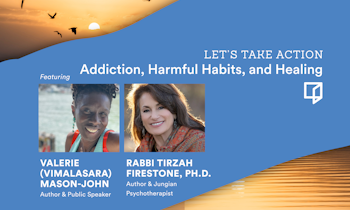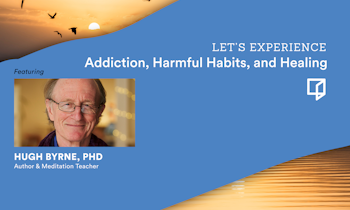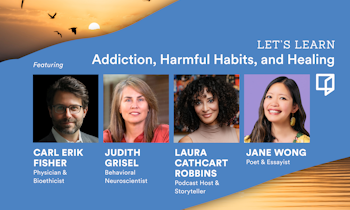Addiction, Harmful Habits, and Healing
November 2023
Most of us have unhealthy habits – repetitive actions and practices that we know we should stop but are difficult to give up.
Some bad habits are mild, and some are severe. Many of us must also deal with addiction. Unlike poor habits, addictions are complex diseases that can take control of our behavior, destroy interpersonal relationships, harm entire societies, and most often require treatment and lifestyle changes to manage.
What are the root causes of harmful habits, negative behavior patterns, and addictions? What kinds of losses do people with addictions and their caregivers experience? How can we support loved ones whose grief over addiction cannot be fully expressed due to stigma and shame? How can we create more space to process the collective grief of the opioid epidemic and other related public health crises? What tools and resources lead to transformation and lasting change?
In this three-part series, speakers from various fields – neuroscience, psychiatry, art, mindfulness, and spirituality – address the harmful effects of food, alcohol, drugs, and gambling and identify pathways toward love, health, and healing.
Register now to secure your spot!
Upcoming Events
There are no upcoming events
Past Events

November 29, 2023
In this culminating session of the “Addiction, Harmful Habits, and Healing” series, esteemed spiritual leaders Rabbi Tirzah Firestone and Vimalasara explore the role of ancestral trauma in our quest for holistic health and spiritual wellness. Bringing distinct cultural and religious perspectives, both speakers underscore the importance of mindfulness and meditation as vital tools to break free from destructive patterns. Expect inspiring stories, interactive dialogue, and actionable steps to enhance your wellbeing and interpersonal relationships.
Following their discussion, we will invite you to join small peer-led breakout room sessions guided by the following prompts:
- What insights have you gained about yourself through your struggles with harmful habits or addictions? Can you name at least one new opportunity or see one new pathway that has cleared?
- How do you manage difficult emotions? Are there specific mindfulness techniques that have been effective for you?
- What roles can service, advocacy, or activism play in your journey through ancestral trauma?
Rabbi Tirzah Firestone, PhD, is an author, Jungian psychotherapist, and spiritual leader in the international Jewish Renewal Movement, and a renowned Jewish scholar and teacher. She was ordained by Reb Zalman in 1992 and is widely known for her groundbreaking work on Kabbalah, depth psychology, intergenerational trauma healing, and the re-integration of the feminine wisdom tradition within Judaism. Rabbi Tirzah lectures and teaches nationally about spiritual and ancient wisdom practices that are honed to assist us at this critical time in world history. Her latest work, Wounds into Wisdom: Healing Intergenerational Jewish Trauma (Monkfish, 2019) is the recipient of the 2020 Nautilus Book Award Gold in Psychology and the Jewish Women's Caucus of the Association for Women in Psychology 2020 book award. www.tirzahfirestone.com | @tirzahfire
Poet, author, and public speaker Valerie (Vimalasara) Mason-John is the award-winning author/editor of ten books. Their debut novel, Borrowed Body, won the 2006 Mind Book of the Year Award. They co-authored the award-winning book Eight Step Recovery: Using the Buddha’s Teachings to Overcome Addiction. And authored Detox Your Heart Meditations for Emotional Trauma. They are one of the founding facilitators of Dr. Gabor's Mate's Compassionate Inquiry, and have curated ten conversations on the Psychedelics as a Path to Freedom: A New Frontier for Mental Health Treatment. Their most recent book I Am Still Your Negro: An Homage to James Baldwin has won critical acclaim. They began writing as an international correspondent covering Aboriginal deaths in custody and land rights in Australia. They are a senior teacher in the Triratna Buddhist Community and one of the leading African descent voices in the field of mindfulness for addiction. In 2024 A First Aid Kit for The Mind: Working with Habitual Behaviours will be published. They work as an international public speaker and professional trainer in the field of mindfulness approaches for addiction and trauma. They live on the Sunshine Coast, British Columbia. www.valeriemason-john.com @vmasonjohn
About Reimagine and the Series "Addiction, Harmful Habits, and Healing"
Reimagine is a nonprofit organization catalyzing a uniquely powerful community–people of different backgrounds, ages, races, and faiths (and no faith) coming together in the hopes of healing ourselves and the world. We specifically support each other in facing adversity, loss, and mortality and–at our own pace– actively channeling life's biggest challenges into meaningful action and growth. www.letsreimagine.org
Most of us have unhealthy habits – repetitive actions and practices that we know we should stop but are difficult to give up. Some bad habits are mild, and some are severe. Many of us must also deal with addiction. Unlike poor habits, addictions are complex diseases that can take control of our behavior, destroy interpersonal relationships, harm entire societies, and most often require treatment and lifestyle changes to manage.
What are the root causes of harmful habits, negative behavior patterns, and addictions? What kinds of losses do people with addictions and their caregivers experience? How can we support loved ones whose grief over addiction cannot be fully expressed due to stigma and shame? How can we create more space to process the collective grief of the opioid epidemic and other related public health crises? What tools and resources lead to transformation and lasting change?
In this three-part series, speakers from various fields – neuroscience, psychiatry, art, mindfulness, and spirituality – address the harmful effects of food, alcohol, drugs, and gambling and identify pathways toward love, health, and healing.
Type:
Talk, Panel, & Conversation,Zoom

November 15, 2023
Hugh Byrne, PhD guides workshop participants in experiential practices of mindfulness and self-compassion to help bring into awareness habits that have become unconscious, automatic, and difficult to change. We will learn, both cognitively and through direct experience, the role that mindfulness plays in letting go of unwanted habits and developing more helpful ones. Leading with kindness, acceptance and non-judgment, we will take time for sharing, questions, and inviting intentions that we can bring back into our daily lives.
Almost all of us have habits we’d like to change—behaviors we’d like to end, like smoking or getting angry a lot—or to develop—such as starting a yoga or meditation practice or eating healthy foods. We might already have tried, and found that habits can be difficult to change.
This is because, once they get established through repetition over time, habits are governed by the ancient part of our human brain rather than the more recently developed, pre-frontal cortex. Habitual behaviors become automatic and unconscious—think about putting on a seat-belt when you get in a car—and less accessible to our intentions to make change.
The good news is that even entrenched habits can be changed by bringing the behavior and its triggers into awareness: Mindfulness, or conscious, non-judging awareness, is key to making what has become unconscious conscious. We can then choose to make change. Without awareness, we remain unconscious and a prisoner of our habits.
Please bring some paper and a writing instrument.
Hugh Byrne, PhD, has practiced mindfulness meditation for more than three decades and been teaching Buddhist and secular mindfulness since 2000. Hugh is trained in Mindfulness-Based Stress Reduction (MBSR) and Somatic Experiencing, a mind-body approach to healing trauma. He worked for more than two decades in the fields of human rights and social justice. Hugh is a senior meditation teacher with the Insight Meditation Community of Washington and leads classes, retreats, and workshops in the United States and internationally. He is the author of two books on mindfulness and habit change: The Here-and-Now Habit (2016) and Habit Swap (2020) and has a law degree from London University and a PhD in political science from the University of California, Los Angeles (UCLA). https://hugh-byrne.com/
About Reimagine and the Series "Addiction, Harmful Habits, and Healing"
Reimagine is a nonprofit organization catalyzing a uniquely powerful community–people of different backgrounds, ages, races, and faiths (and no faith) coming together in the hopes of healing ourselves and the world. We specifically support each other in facing adversity, loss, and mortality and–at our own pace– actively channeling life's biggest challenges into meaningful action and growth. www.letsreimagine.org
Most of us have unhealthy habits – repetitive actions and practices that we know we should stop but are difficult to give up. Some bad habits are mild, and some are severe. Many of us must also deal with addiction. Unlike poor habits, addictions are complex diseases that can take control of our behavior, destroy interpersonal relationships, harm entire societies, and most often require treatment and lifestyle changes to manage.
What are the root causes of harmful habits, negative behavior patterns, and addictions? What kinds of losses do people with addictions and their caregivers experience? How can we support loved ones whose grief over addiction cannot be fully expressed due to stigma and shame? How can we create more space to process the collective grief of the opioid epidemic and other related public health crises? What tools and resources lead to transformation and lasting change?
In this three-part series, speakers from various fields – neuroscience, psychiatry, art, mindfulness, and spirituality – address the harmful effects of food, alcohol, drugs, and gambling and identify pathways toward love, health, and healing.
Type:
Workshop, Meditation,Zoom

November 8, 2023
In this lively panel discussion, a diverse group of speakers who have authored recent books on addiction will share their first-hand accounts of addiction struggle. Emphasizing scientific-based research, trauma-informed care, and lived experience, these writers will provide insights on shame, hiding, and disclosure. Infused with humor, sorrow, and candor, their discussion will explore the impact of addiction and recovery on one’s friends, colleagues, family, and communities and resources for rebuilding lives.
Meet renowned neuroscientist and recovering addict Judy Grisel who offers surprising ways to combat today’s addiction epidemic. Engage with Laura Cathcart Robbins, host of the podcast The Only One in the Room, who shares her journey to sobriety and self-love amidst privilege and racism. Learn with poet and memoirist Jane Wong about her father’s gambling addiction, her mother’s love and care to sustain the family, and the crumbling American Dream for today’s immigrant families targeted by casinos. And understand how historical research helped psychiatrist Carl Erik Fisher with his own addiction crisis that nearly cost him everything.
Speakers
Carl Erik Fisher, MD, is an addiction physician, bioethicist, and person in recovery. He is an expert in addiction and recovery who has sought to make sense of topics like self-control, suffering, and behavioral change across an unexpected variety of topics and fields: not just science and medicine but also history, spirituality, philosophy, politics, arts and literature, and more. Through deep investigations of these surprising perspectives, Carl seeks out the ideas and practices that help all people flourish in their lives.
Dr. Fisher is the author of the nonfiction book The Urge: Our History of Addiction: a history of addiction from Ancient India and Greece to the present day, interwoven with his own experiences as an addiction psychiatrist at Columbia and as someone in recovery himself. It was named one of the best books of the year by The New Yorker. He is an assistant professor of clinical psychiatry at Columbia University, where he studies the role of neuroscience and psychiatry in society. He also maintains a private psychiatry practice focused on addiction, with a special focus on complementary and integrative practices like the evolving science of mindfulness and meditation. He also is the host of the Flourishing After Addiction podcast, a deep-dive interview series exploring addiction and recovery. https://www.carlerikfisher.com/ @drcarlerik
Judith Grisel, Ph.D., began researching the use and abuse of recreational drugs during adolescence. After hitting bottom and getting clean and sober in her twenties, she went on to earn a doctorate in behavioral neuroscience. Today, as a professor at Bucknell University, her research is focused on understanding why some people are more prone to substance use disorders than others.
Judy was drinking and using other drugs by the time she was 13. Within a decade, she'd been kicked out of three schools, became homeless, contracted Hepatitis C from sharing needles, and lost the respect of virtually everyone she knew, including herself. Faced with the choice between an early grave and abstinence, Judy reasoned that a better understanding of the neural substrates of substance use disorders might provide an alternative to self-destruction. Today, she's been clean and sober for over three decades and is a renowned neuroscientist and teacher. In 2019 Judy published a bestselling book, Never Enough: The Neuroscience and Experience of Addiction, which has since garnered a worldwide audience.
Laura Cathcart Robbins is an author, freelance writer, speaker, and host of the popular podcast The Only One in the Room. Her new book Stash: My Life in Hiding – named a best memoir of 2023 by Elle – vividly documents her journey to sobriety and self-love amidst privilege and racism. She has been active for many years as a speaker and school trustee and is credited for creating The Buckley School’s nationally recognized committee on Diversity, Equity, Inclusion, and Justice. Her recent articles in HuffPost and The Temper on the subjects of race, recovery, and divorce have garnered her worldwide acclaim. She is a 2022 TEDx Speaker and an LA Moth StorySlam winner. Currently, she sits on the advisory boards of the San Diego Writer’s Festival and the Outliers HQ Podcast Festival. She lives in California. https://lauracathcartrobbins.com/ @LauraCathcartRobbins
Jane Wong is the author of the memoir Meet Me Tonight in Atlantic City (Tin House, 2023). She also wrote two poetry collections: How to Not Be Afraid of Everything (Alice James, 2021) and Overpour (Action Books, 2016). A Kundiman fellow, she is the recipient of a Pushcart Prize and fellowships and residencies from the U.S. Fulbright Program, Harvard's Woodberry Poetry Room, Artist Trust, Hedgebrook, UCross, Loghaven, and others. She grew up in a take-out restaurant on the Jersey Shore and is an Associate Professor at Western Washington University. https://janewongwriter.com/ @paradeofcats Photo: Gritchelle Fallesgon
About Reimagine and the Series "Addiction, Harmful Habits, and Healing"
Reimagine is a nonprofit organization catalyzing a uniquely powerful community–people of different backgrounds, ages, races, and faiths (and no faith) coming together in the hopes of healing ourselves and the world. We specifically support each other in facing adversity, loss, and mortality and–at our own pace– actively channeling life's biggest challenges into meaningful action and growth. www.letsreimagine.org
Most of us have unhealthy habits – repetitive actions and practices that we know we should stop but are difficult to give up. Some bad habits are mild, and some are severe. Many of us must also deal with addiction. Unlike poor habits, addictions are complex diseases that can take control of our behavior, destroy interpersonal relationships, harm entire societies, and most often require treatment and lifestyle changes to manage.
What are the root causes of harmful habits, negative behavior patterns, and addictions? What kinds of losses do people with addictions and their caregivers experience? How can we support loved ones whose grief over addiction cannot be fully expressed due to stigma and shame? How can we create more space to process the collective grief of the opioid epidemic and other related public health crises? What tools and resources lead to transformation and lasting change?
In this three-part series, speakers from various fields – neuroscience, psychiatry, art, mindfulness, and spirituality – address the harmful effects of food, alcohol, drugs, and gambling and identify pathways toward love, health, and healing.
Type:
Talk, Panel, & Conversation,Zoom

